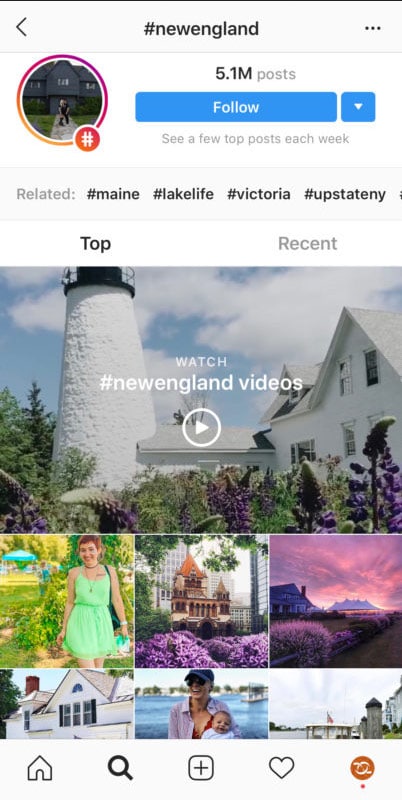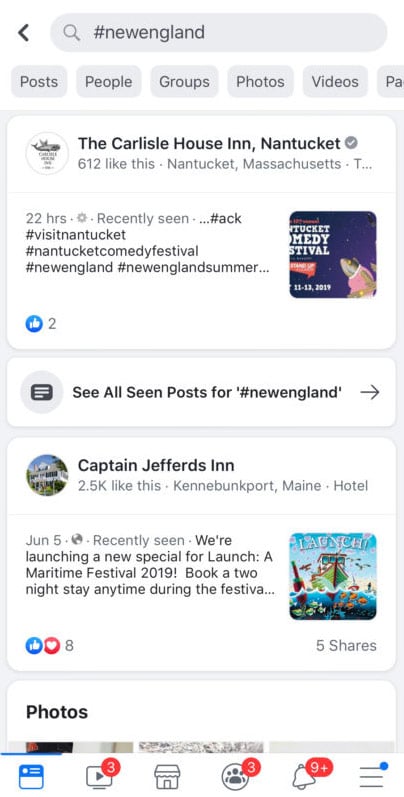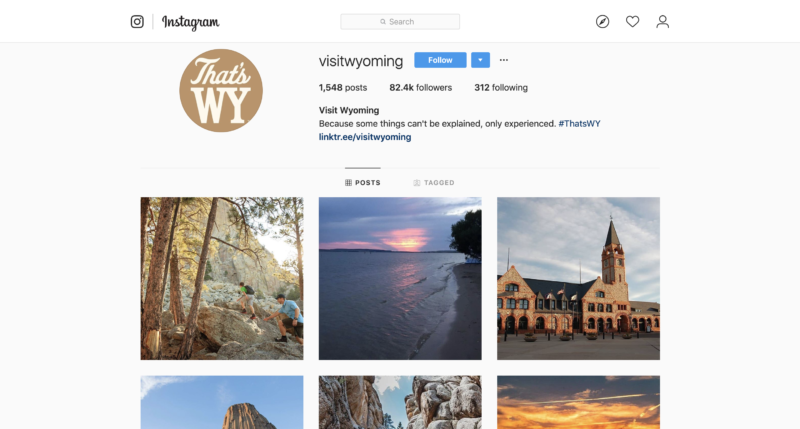
There is a collection of generations that call the criss-cross sign on your keypad a pound symbol. Younger generations more readily identify that same sign as a hashtag. No matter the generation you fall in, today’s marketing has made the hashtag a symbol you need to know. If you want to know how to communicate on social media, that is. Considering, 74% of travelers use social media while traveling, it’s vital that small businesses in the travel industry take advantage of this cost-effective way to improve visibility and brand engagement. That’s where hashtag marketing comes in.
How to use Hashtag Marketing
A hashtag is a combination of a hash sign (#) followed by two or three words that create a link when typed together without spaces.
These links categorize information allowing users to explore posts on a platform by a specific hashtag. Hashtags have become so crucial to social media platforms that they can be included in the caption of posts, onto videos, and onto photos in stories. You can even add them in your bio on Instagram and Twitter. They help to define online communities and support social causes. They guide small businesses to know how to speak to customers and forecast industry trends. Knowing how to speak and understand hashtags give small businesses an advantage through real-time insights and real person feedback.
For example, here’s what search results look like for #newengland on Instagram, Facebook, and Twitter:
If you are a New England bed and breakfast, it would be beneficial to include this location specific hashtag in your posts. You would show up in the above search results! Time of post, amount of engagement (likes & comments), and how many other people are using the same hashtag affects where on the page results your post will appear. Nonetheless, you’re gaining visibility you did not have before just by knowing how to put letters and symbols together. So, how can you leverage the visibility of such a simple marketing tactic? We’ll discuss a few key aspects to understand and remember when developing your hashtag marketing strategy.
Types of Hashtags
1. Popular Hashtags:
These hashtags are familiar, popular to use, and easy to remember. They can humanize your social media accounts within familiar bounds to your audience. Think of #TBT (#ThrowbackThursday), #MondayMotivation, and #WednesdayWisdom as examples. #TBT has been tagged in over 428 million posts. It is one of the most used hashtags on Instagram. If your brand has a past, use #TBT to share it. If your brand is newer, you can use the hashtag to dig into the history of your products or industry. Alternatively, consider excitement building hashtags like #contest and #giveaway. Social media marketing campaigns often include some variation of a sweepstakes to either increase followers and engagement.
2. Niche Hashtags:
Our clients in the travel industry understand niche marketing as small businesses in the industry capitalize on niche markets to be successful. The same tailored approach to hashtagging results in better chances of genuine engagement. The more specific a hashtag is, the more targeted your audience will be. For example, #traveltuesday started in the travel industry as a way to foster conversation on Twitter about travel deals and tips. Yet, if your business has a specific focus like #vegantravel then using the more specific hashtag would foster discussion on vegan travel inspiration and tips.
3. Brand Hashtags:
Brand hashtags are unique to a brand or a brand’s marketing campaign. It can be the company’s name, a type of product, a tagline, or phrase associated with the brand’s values. They are used to build community, develop engagement, and increase cross-promotion. For example, visit Travel & Leisure on social media. You’ll see prompts to use #TLpicks for a chance to be featured on their magazine’s social media accounts. If you want the latest remodel of your property to be featured give this hashtag a chance! In addition, brand hashtags are a great way to promote your own aesthetic and values. Do you use eco-friendly bath products in your guest suites? Include that brand’s hashtags the next time you share a photo of your luxurious bathrooms.
4. Seasonal/ Holiday Hashtags:
Are there hiking trails on or connected to your ranch? You may want to consider using #nationaltakeahikeday. Or do you make delicious desserts at your restaurant? There are quite a few hashtags that could gain you visibility. Try #nationalchocolatecakeday or #nationalcheesecakeday. Similarly, using #merrychristmas to celebrate could be a great way to connect with a particular demographic of consumers. Promote your romantic getaway with #valentinesday or your spa services with #mothersday leading up to the holidays.
5. Industry Hashtags:
Everyone in the lodging industry is talking about how to get guest to #bookdirect. It’s an industry hashtag worth using to help educate potential guests on the benefits of booking directly through lodging property website versus third-party websites. Another one in the lodging industry that is more engagement based is #bnbchallenge. Prompts are given on social media for bed and breakfasts to share a photo, video, or story. Industry hashtags can help you network to build a following. Moreover, they can help you stay up to date in the industry.
6. Location Based Hashtags:
Any business that isn’t strictly an online business wants customers to find their location. Hashtags that are location-based help customers find you based on their interest in a specific area. For example, #wanderwashington is a Washington state based hashtag with awe-inspiring photographs. An easy way to discover location-based hashtags is to start with your state. First, find your state’s official website and see what hashtags are used on their website and social media accounts. The official website for Wyoming is Travel Wyoming. They coined #thatswy as their location-based branded hashtag and it can be found as a tagline throughout their website and social media. Next, do the same thing for your city. Maybe, you’re located downtown and that area has its own tourism website. Check that one too.
Hashtag Marketing Etiquette
Content is king for hashtags too. Like any type of content you share on social media, it’s all about the audience. Above all, your content needs to be relevant and specific to what you’re posting at the time. Keep it consistent with what your overall brand represents. Conversely, unrelated hashtags can make a brand seem untrustworthy or incompetent. Instagram has a hashtag maximum of 30 hashtags per post and 10 per story. If you include more, the post or story will not upload. Experiment with a combination of popular and niche hashtags to find your brand’s sweet spot.
Check what it means or how it has been used. When you combine two or three words together for a hashtag, does it spell out something else? When you search the hashtag you want to use are others posting photos or articles that you expected? It would be quite unfortunate to tag your business post with something raunchy, inappropriate, or that just does not correspond with your company values.
Avoid hashtags that shamelessly solicit likes and followers. #followme, #like4like, #follow4follow, #tagsforlikes, etc. These hashtags can give potential customers the impressions that your brand isn’t authentic. They can attract bots, spammers, and other users who have no intention of engaging with you. Or, your community in a meaningful way.
60% of travelers share photos to social media while on vacation.
Hashtag Marketing Hacks
Create your own hashtag. A unique hashtag is a part of building any brand in 2019. For our clients in the travel industry, it is crucial. Does your inn have a hashtag that guests can use when sharing photos of the view from their balcony room? Or, one to include with the video of their son horseback riding at your dude ranch? These guest posts act like reviews to other potential guests every time they are shared. A dedicated hashtag for your business helps organize these photos, videos, comments, into useful information for the community you are building around your brand. Additionally, it’s a great way to foster engagement and collect user-generated content. Keep your brand hashtags short and easy to remember.
Save hashtags for repeat use. After getting comfortable with social media and doing research on the different combinations of hashtags, you’ll start to develop a list of hashtags that can be used with most of your posts. For example, a medium sized event venue could have a hashtag list for promoting posts related to weddings and a separate hashtag list for posts related to work retreats. It will save you time and build a consistent representation of your brand under those hashtags. Try using a notes app on your phone to store your hashtag lists. Or, use a Pages/ Word document on your computer.
Copy from competitors and influential people in your industry. Focus on companies and people that are already well established on social media. They may already have a pulse on popular hashtags in your niche and can open your eyes to new ways of hashtag promoting. However, not every hashtag your competitor uses will represent you. We would caution to stay true to your brand still. Using hashtags tied to influential people in the industry could also result in cross promotion if those accounts do reposts or shout outs.
Use Instagram’s search function. Firstly, find the magnifying glass icon at the bottom of the page if you’re on mobile. On a laptop, you’ll find the search bar at the top of the page. Secondly, type a keyword that’s relevant to your brand into Instagram’s search bar. Then, select “Tags” and Instagram will give you a list of all the hashtags with that keyword. You’ll also see a number which indicates how many posts are tagged with it. On any hashtag results page, right above the “Top” and “Recent” tabs, you’ll find a list of related hashtags. Scroll through these to find relevant hashtags that might be a bit more niche.
59% of travelers posted a status update about upcoming travel
We know you’re busy making sure your website is ADA compliant for inclusion. Or, you’re building trust with your customers with an SSL certificate. We also know that social media strategies for hashtag marketing will increase your online engagement and drive more traffic to your website. Luckily, you don’t have to tackle this alone. Let us help you learn about organically increasing brand awareness and website visits through digital marketing. Contact us today!




